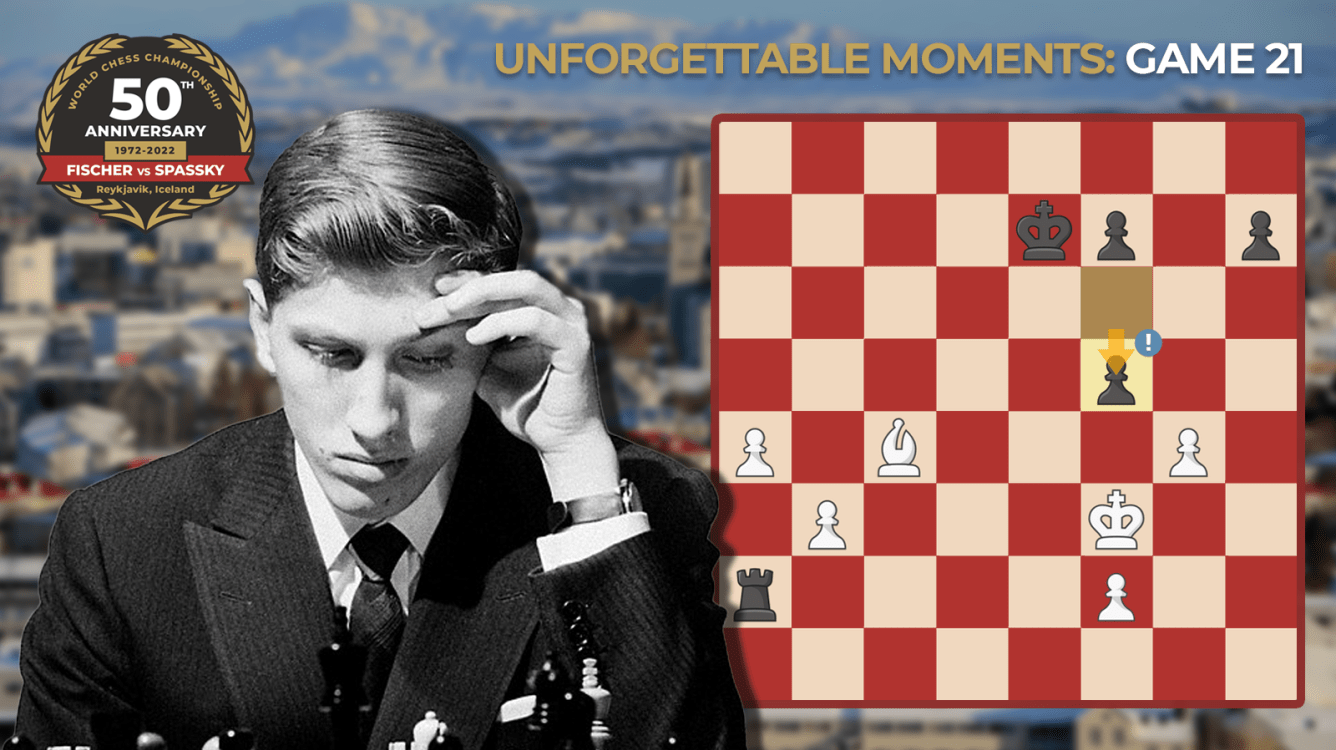
Bobby Fischer Wins Match Of The Century
Today, half a century ago, was a historic day for chess, and the whole world was watching. GM Bobby Fischer had done it! He fought, almost single-handedly, against the Soviet chess machine, and emerged as the first American world champion of chess in history. Our coverage of the Match of the Century ends with a report on the 21st game.
When we last left you after the 13th game of the 1972 World Championship, Fischer just taken a three-point lead on GM Boris Spassky. Seven games later, it was still a three-point lead, with 11.5 points for Fischer and 8.5 for Spassky.
Rather than maintain the status quo, those seven games of total equality had all but ended the match. All that was left for Fischer before the 21st game was to win (or draw two more times) and he would have the 12.5 points needed to become the 11th official world chess champion.
Befitting of the moment is the striking footage of each grandmaster entering the playing hall on August 31. Spassky is given plenty of space as if a dead man walking. Fischer, meanwhile, has his car surrounded and then sprints for the entrance. He is barely seen.
After he had navigated the masses and made it to the board, Fischer played his favored Sicilian Defense, but not the variation that had gotten him crushed in game 11. He went with the Taimanov Variation (by transposition) instead. Coincidentally, Fischer had swept its namesake, GM Mark Taimanov, 6-0 on the road to Reykjavik. After starting his Candidates run against Taimanov, Fischer was about to use his opening to finish the job.
The switch proved justified. After seven moves, Spassky was already off balance.

I suppose that at this point there wasn't much doubt left for the public and for the players about the outcome of the match, but the final game offers an interesting summary of what happened so far. The challenger surprises once again with his opening choice, playing the Taimanov Variation of the Sicilian for the first name. Spassky's play is not very inspiring during the opening and the middlegame.
Even so, a drawn endgame arises, but a blunder leads to defeat. From the outside, with a computer engine turned on after 50 years, it's easy to point out the technical mistakes that decided the game. But the pressure that the then-world champion had to endure before and during the match—that I can only imagine.
It's the end of the most awaited match in chess history, the culmination of a fulminating trajectory for the American genius towards the world title. His greatest life goal had been achieved. To the dismay of all chess lovers, however, he would not play another chess game until 1992, against the same Spassky.
The game was adjourned on August 31. Instead of coming back on September 1, however, Spassky resigned the game and the match by telephoning the arbiter. Fischer was surprised but went to the playing hall, signed all the paperwork, and officially became the world champion. What now?
Spassky spoke to the Associated Press just after the match and seemed somewhat relieved to no longer have the responsibilities of a world champion. "I had to do many things for chess, but not for myself, as champion of the world," he told them.
Spassky, ever the sportsman, accepted those responsibilities, sacrificed whatever things for himself that he might have preferred doing, and lost his title in the traditional way. But it's clear that even players who don't give up the championship, as Fischer and GM Magnus Carlsen have, can simply be exhausted by everything the title brings with it.
For his part, at first the new champion seemed to enjoy the usual trappings of American celebrity. His victory tour culminated with an appearance on Johnny Carson's Tonight Show in November 1972. Many people already know how this story ends, but it's no less tragic. Perhaps never planning to defend in 1975, Fischer tries to rework the match format, but negotiations fail and he gives up the title. In the meantime, he has stopped all public appearances and played no chess. Except for his 1992 rematch with Spassky and a few other aberrations, that status remains true until his death in 2008. Additionally, what few public appearances do occur reveal a broken soul at best and a raging anti-Semite at worst.
On September 1, 1972, however, that player was at the top of the chess world. At the same time, after his utter dominance during 1970-72, it was clear that the only person who could stop Fischer was himself.
Previous 50th Anniversary Fischer-Spassky Articles:
- Bobby Fischer Wins A Chaotic Brilliancy
- Boris Spassky Smashes Fischer's Najdorf
- Bobby Fischer Wins Positional Masterpiece
- Bobby Fischer Ties The Match
- Everything You Need To Know About Bobby Fischer
- Everything You Need To Know About Boris Spassky
- Bobby Fischer Scores 1st Win
- Bobby Fischer Forfeits Game 2
- Bobby Fischer Plays An Incredible Blunder
- 50 Years Later: Why Fischer Vs. Spassky Was The Greatest World Championship Match
- Why The Match Of The Century Almost Didn't Happen






